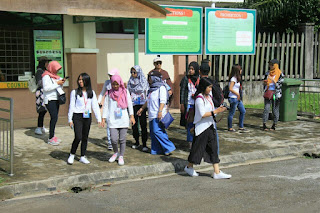About Cesar Chavez, and hi lets find verbs and subjects too!
Assalamualaikum, now i'll write about Caesar Cavez. Who is he? He is a.....
Eits! Wait!
But first, let's read this articles, you can know which subjects and verbs, nah subjects are words that i give PINK color like this, and verbs are that i give BLUE color. Understood? Ok let's find out about who is Cesar Chaves .
CESAR CHAVEZ
"He faced strong, often violent, opposition
without violence. And he was victorious. Cesar Chavez left our world better
than he found it. And his work encourages us still. He was, for his own people,
a leader to freedom. Farm workers in the fields wanted to gain respect and
support themselves. They looked for hope to this man. Cesar Chavez had faith
and worked hard. With gentleness and amazing inner strength, he led a very
courageous life."
These are the words of President Bill Clinton of the
United States. He was speaking in 1994 about a man named Cesar Chavez. Clinton
awarded Chavez the Presidential Medal of Freedom. By that time, Chavez had
died. But his example continues to encourage thousands of people. Today’s
Spotlight is on Cesar Chavez and his fight for farm worker’s rights.
Cesar Estrada Chavez was born in Arizona in the United
States in 1927. When Chavez was 10 years old, his family had to leave their
farm and house. They became migrant farm workers in the state of California.
There were many families like the Chavez family. Many of these farm workers
were from Mexico. In California, they moved from farm to farm. They worked for
a short time at each place. Cesar Chavez went to 37 different schools. And at
age thirteen he left school completely. Instead, he worked like an adult on a
farm, to make money for his family.
At that time, farm workers like Chavez were not
treated well. Almost all of them were very poor. The employers who owned the
farms did not pay them much money. Adults and children often worked many hours a
day in very bad conditions. The workers’ homes had no electricity or running
water. Some farm owners even used chemicals on the fields while the workers
were there. This was very dangerous for the workers’ health.
Chavez wanted to better conditions for all farm
workers. He began to work with more and more people. Chavez found that the way
to make a change was to help people to work together. When workers came
together as a group they had more power. Chavez said:
"I had a dream that the only reason the employers
were so powerful was that we were weak. We could somehow begin to develop some
strength among ourselves. Then we could begin to equal that, balancing their
power in farming."
Chavez encouraged farm workers to demand rights such
as fair pay and education for their children. He also wanted to change some
laws. At this time it was illegal for farm workers to join a union. These
groups work for better treatment of workers. Chavez fought very hard to form a
farm workers union. But this fight was not violent. Chavez only used peaceful
methods. Chavez said:
"Non-violence is a very powerful weapon. Most
people do not understand the power of non-violence. Those who have been
involved see the difference between violence and non-violence. We are deeply
committed to a lifetime of non-violence. It is not easy, but it is an effective
and very powerful way."
In 1962 Chavez formed the National Farm Workers
Association. They did many non-violent actions such as demonstrating and
marching. Because of these actions, many people learned about farm workers’
problems. Chavez became famous for his fasting. He would not eat for many days.
Once Chavez went for over 30 days without food. This made people see that
Chavez and the workers were serious about change.
One of the National Farm Workers Association’s most
successful actions was a boycott. This is when people stop using a service or
stop buying something. Boycotts often make business owners lose money. A
boycott can force a business to make a change. In 1965 Chavez organized a
boycott of grapes. Farm workers picked this round sweet fruit. But the workers
wanted people to see their bad living conditions. They wanted the farm owners
to pay and treat them fairly.
So they began to march and hold up signs. They told
people about the poor conditions of the farm workers. They asked people to
boycott, or stop buying, grapes. And many people joined them. This forced the
farm owners to make a deal with the farm workers. The workers won the right to
higher pay and other forms of protection. They also won their right to come
together to form a union.
The grape boycott was a big success for Cesar Chavez.
But he gave the credit to all the people who worked together. Chavez was encouraged
by the farm workers who worked so hard.
Violence : kekerasan
Victorious: pemenang
Encourages : meyakinkan
Gentleness: kelemahlembutan
Courageous : berani
Spotlight: pusat perhatian
Instead : selebihnya
Running water : air mengalir
Develop: mengembangkan
Demand : permintaan
Union : serikat
violent: kasar
weapon : senjata
committed : menjalankan
force : memaksa
march : gerakan


Komentar
Posting Komentar